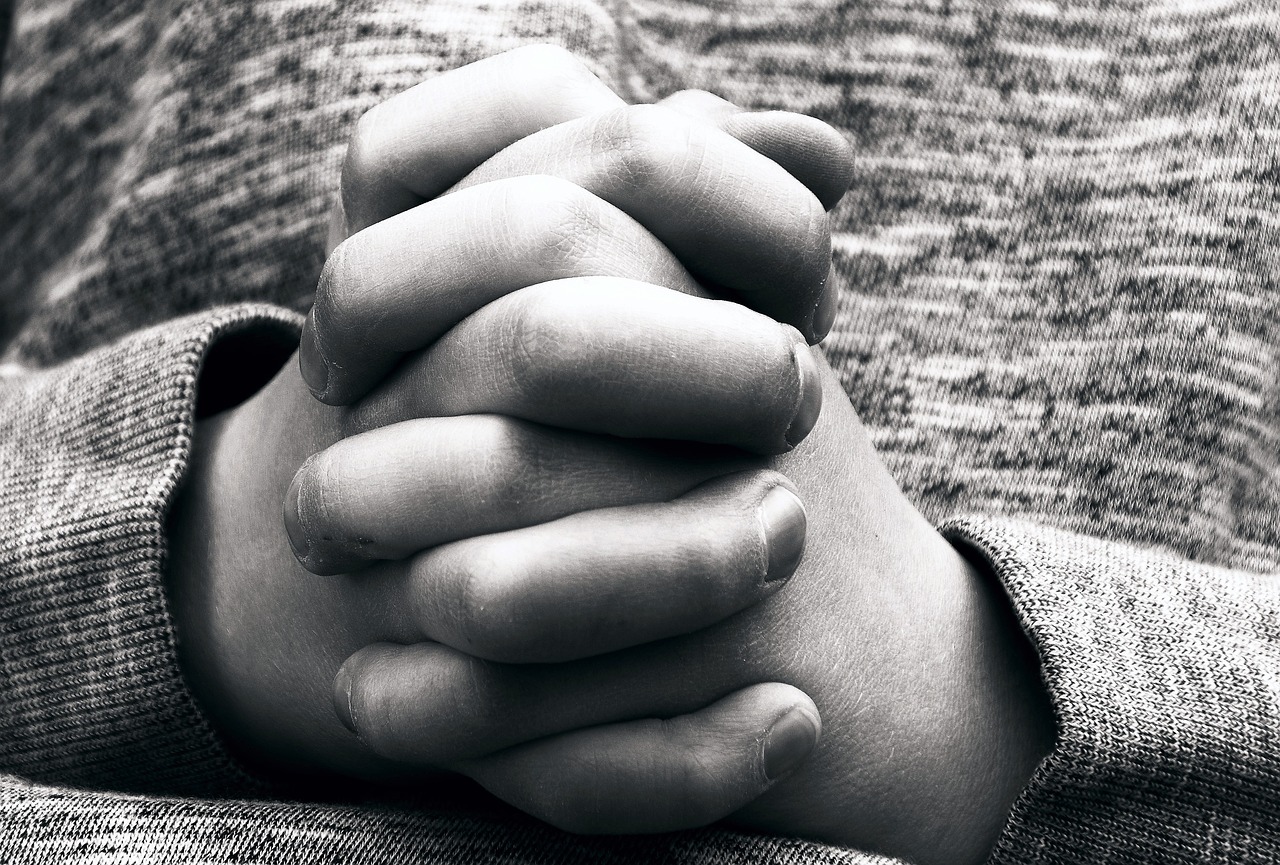Bless me, Father, for I have sinned. Again.
By Michael Brian O’Keefe
Jesus with his crown of thorns struggled under a sweat-stained wooden cross, laboring toward torment and death—and, eventually, Resurrection. I studied the stained-glass scene from the pew where I was sitting next to John Broughton, my sad-eyed best friend. It was 1962 and I was a 7-year-old second grader at the Basilica of St. Mary in Old Town Alexandria. The stained-glass window was partway open, and just outside I could see a plump-bellied robin skittering among the limbs of a hundred-year-old oak that shaded the high-arched church just a few blocks away from the Potomac River and the Woodrow Wilson Bridge. We were there for our first confession, both of us dreading it. The robin’s soulful song pierced my gloom, and for a minute I didn’t feel so much like a boy on death row.
Somebody came out of the confessional—a kid named Alan Keany—which meant Johnny Broughton was next. Johnny slowly rose from the pew and shuffled off, disappearing a few seconds later into the ornate confession booth while Keany slid into the pew behind me, his cheeks streaked with eye-water and his pink hands shaking as he strained to maintain the perfect prayer form we’d been taught by Sister Adrienne. I turned to watch him kneel behind me and mutter his penance: Three Hail Marys and two Our Fathers—a full house. He must have really been bad.
Johnny Broughton’s voice echoed from inside the not-so-soundproof confessional. He got loud when he was nervous. I knew I shouldn’t listen in, but I couldn’t help myself. He told the priest he’d lied six times to his mother, said “shoot” twice, and picked his nose once in Mass. I hoped that last one wasn’t a sin. Father Tom, hidden somewhere deep in the confessional box, cleared his throat in a way that made me wonder if he was trying not to laugh.
I prayed that Johnny would confess a hundred sins, asked God to send him some more, anything to keep him going and me, next in line, safe back here on my pew. But Johnny was a good kid, his sins ordinary and few. Why couldn’t Bobby Maxwell have been in front of me? He’d have kept Father Tom busy all day, what with his smoking and cursing, and pulling girls’ hair, and stopping up the school toilet at least once a week. Bobby spent more time sitting outside the principal’s office than in our classroom.
A warm breeze carried the achy peal of a pewter bell from the lighthouse across the river. It was an eerie and lingering tone I usually only heard at night, when the world and my own mind lay silent and still. I’d gone to the lighthouse once with Johnny not long ago. It was the time we “borrowed” a blue-skinned kayak and crossed the cola-colored froth, paddling furiously through the white-capped, swift-current channel that threatened to capsize us, all the way to the lighthouse’s jagged rock jetty. I wondered if maybe that was something I should confess, too.
The same false-spring zephyr that carried the sound of the lighthouse bell across the river now overtook the cool air of what was left of winter, creating clouds of fog that bloomed like smoke from a great fire. A breath of that fog snaked through the open church window and moisture beaded around Jesus in the stained glass, as if the image itself was weeping, which was how I felt then, too. I wondered whether I was saddened by the prospect of growing up, a regrettable possibility to which my first confession bore undeniable proof. Or was I sad that Jesus had had to suffer death and burial before he could be born again and cleanse our collective souls?
I had once been pure, after baptism. Then I learned the terrible ways of man—smearing strained peas on my younger sister’s favorite doll and back-talking my parents. I wanted to be pure once more, but I was still terrified of the confessional.
***
It was taller inside than I’d imagined, and darker. I couldn’t make out the ceiling. Maybe there was no ceiling, just a limitless vacuum rising all the way to heaven. The kneeler was thickly padded beneath my knees, which fit automatically into the well-worn grooves where sinner after sinner after sinner had knelt before me. I couldn’t help but wonder where all those dirty sins went once they’d been confessed. Were they floating around in the darkness above me?
Father Tom was still listening to the sinner in the confessional on the opposite side of the box—it was a girl; I could tell from the sweet voice—but I blocked out their voices and rehearsed inside my head the prayers and rituals I knew by heart, starting with the Act of Contrition. I repeated it three consecutive times to myself while I waited my turn, knowing that was where most rookies messed up—so close to the finish line yet so far. I’d also inked a list of my sins onto my left palm to relieve myself of the burden of memorizing them. But, when I opened my hand and moved it in front of my face, I found only panic. It was too dark inside the confessional, and I couldn’t make out a single word. God, apparently, didn’t allow cheating.
Suddenly, WHOOSH, the sound and moment I’d been dreading came to pass, as Father Tom slid open the panel between his mysterious lair and my coffin. That’s what it felt like, anyway, as I stammered out the same words every other kid had said to kick-start my purification: “Bless me Father, for I have sinned. This is my first confession….”
“Yes, Michael,” Father Tom interrupted. “Relax dear boy and tell me all your sins.”
I was mortified. Nobody had warned me that the priest might know who I was. I immediately blamed my parents for inviting Father Tom to dinner way too often and for giving me a readily identifiable voice. And what did Father Tom mean by ALL of my sins? I had nothing. The ones I’d written on my hand had been beauties, but now they were lost to darkness.
So I confessed to that: “I’m sorry Father, I’ve forgotten my sins. I wrote them on my palm. Can you turn on the lights in here please? I have some good ones. I think you’ll be impressed.”
“You’ve always been an entertaining and smart lad, Michael,” Father Tom responded. “I’m sure you can recall a few from memory.”
“Okay, Father, how about…adulterly? A lot!”
Father Tom laughed out loud, and I heard others laughing in the pews. My squeaky voice, and my misfortune of being last in the confessional, were playing against me. Everyone was listening. They were done and pure. I was still on the spot and spotted. I felt like dirty dishes in the sink, spaghetti sauce griming my entire being while everyone else had caught the earlier dishwasher load and rested gleaming in the cabinets.
“Adultery is not what you think,” Father Tom said. “Neither is adulterly. Perhaps you mean you’ve been acting too big for your britches.”
“Exactly, Father,” I said, relieved. “Also, I put wet dog food on my brother’s sloppy joe last Tuesday night.”
Father laughed again, and so did everybody else. I imagined them crowded around the confessional, holding inverted drinking glasses to their ears, pressed to the walls all around me.
“Sweet goodness, Michael,” Father Tom said. “Dog food? How did you get away with that?
“I’m sneaky Father. Is that a sin? If so, I confess!’
“Are there more sins. Michael. Perhaps a few lies or curse words?”
“Heck no, Father. I mean, maybe a few times, but only when I fall down or something. Father, can I ask you something? If it’s a sin to give dog food to my brother, is it also a sin to give people food to my dog?”
“Heavens no. Dogs like people food, that’s the difference, don’t you think, Michael?”
“My brother didn’t mind the dog food. He came back for seconds.”
“Oh, shame on you, Laddie. It’s what’s in your heart that made it a sin, not what was in his stomach. Michael, Michael, Michael. What am I to do with you? Better say a good Act of Contrition now.”
That I was ready for, and I recited it for Father Tom without taking a breath: “O my God, I am heartily sorry for having offended Thee, and I detest all my sins because of Thy just punishments, but most of all because they offend Thee, my God, who art all good and deserving of all my love. I firmly resolve with the help of Thy grace to sin no more and to avoid the near occasion of sin. Amen.”
After I was through, Father Tom assigned me half the prayers in the standard catechism book as my penance. It was definitely cruel and unusual punishment, but like the TV detective Baretta always warned, “Don’t do the crime if you can’t do the time.”
That same robin was perched on the windowsill next to my pew when I returned from the confessional. I picked up the prayer book and started in on my penance, trying to give my soul a thorough, if quick, cleansing. The robin sang a pretty song, but it was distracting me and slowing me down. I tried to ignore it. Then I tried to shoo it away, but it just kept serenading me and getting on my nerves. I couldn’t concentrate. It was like when my little sister loaded up Tommy Roe’s “Dizzy” on her 45 rpm-record player with the rocker arm in up position so that it played a hundred million times in a row just to make me angry.
Finally, not knowing what else to do, I grabbed a missal from the back of the pew in front of me and threw it. I told myself later that I’d meant to gently toss it close enough to scare the robin away, but either my aim was off or I actually did want to hit it, because that’s what happened, stunning the bird and knocking it off the windowsill and onto the floor. Before I could scoop it up and let it back outside, though, Father Tom stepped out of the confessional. Maybe he was going to congratulate me on making such a terrific first confession. Maybe he was going to say something to our class. Whatever it was, all any of us heard was a CRUNCH beneath his polished dress shoe.
Everybody knew right away. Mary Elizabeth screamed. Sister Adrienne fainted. Father Tom lifted his shoe and looked down at the crushed robin. He looked at the missal on the floor by the open stained-glass window. He looked at me and nodded toward the confessional. I followed him back inside.
“Bless me Father for I have sinned,” I said after he slid open the panel. “It has been about five minutes since my last confession….”
***
Michael O’Keefe was raised in Alexandria, Virginia, where he specialized in unintentionally driving his parents bonkers with reptiles and amphibians he carried home from his daily haunts of creeks and ponds. He attended St. Mary School in first and second grades, and, by mutual consent between his parents and the principal, moved on to public school for third grade. As a college dropout, he did time as a D.C. and Fairfax County cop before injuries led him back to college, on to law school, and into private practice and public service as a lawyer. Happily married for 38 years, he has three grown children and three grands. Most hiking seasons will find him wearing his backpack and on the go somewhere in Ireland or along the Colorado Trail.
Portrait of the author as a young boy


